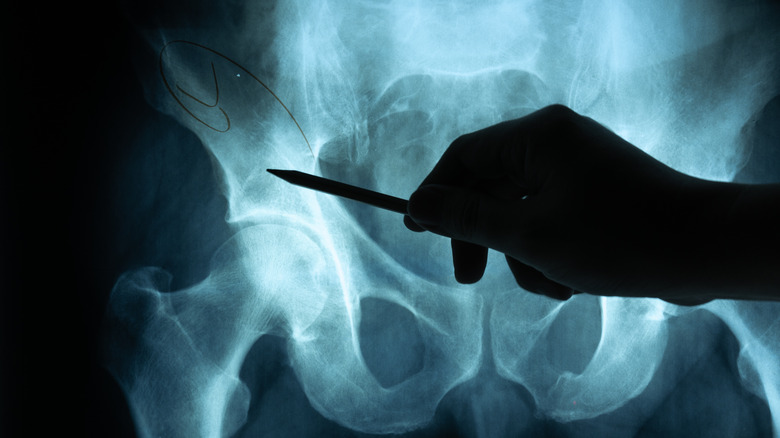The Long-Term Side Effects Of Caffeine
For many of us, it's hard to imagine our mornings without a mug of our favorite coffee. Approximately 70% of people drink coffee weekly in the United States, while 62% drink it every day (via National Coffee Association). Additionally, the average American coffee drinker has at least 3 cups daily.
So, what makes caffeine so popular? It's the effect it has on us! Caffeine acts as a stimulant and blocks the drowsiness-causing neurotransmitter called adenosine (via Verywell Mind). It does so by binding itself to the adenosine receptors, which results in nerve cell stimulation. The stimulation of the nerve cells makes the pituitary gland release hormones. These hormones stimulate our adrenal glands to produce adrenaline, which opens up the body's air passage and increases oxygen concentration in our blood. An increased oxygen level helps us feel focused and resolved.
But what's the cost of that rush that we seek every morning? Long-term caffeine consumption is certainly not without side effects.
You may develop a caffeine dependency
While enjoying your morning latte, it's easy to forget that, at the end of the day, caffeine is classified as a stimulant drug, which is regulated by the U.S. Food and Drug Administration (FDA). The maximum daily intake recommended for healthy adults is no more than 400 milligrams of caffeine per day, or the equivalent of roughly 4 to 5 cups of java. While caffeine works wonders at jump starting our metabolism and concentration, just as with any other drug, we can become dependent on the substance and progressively develop an increased tolerance (via Addiction Center).
Long-term consumption of caffeine can prompt chemical changes in the brain, leading us to want more until we achieve the initial buzz we once had. As a result of increasing your caffeine levels, withdrawal symptoms and cravings can set in if you suddenly decide to go caffeine-free. While caffeine addiction is not formally recognized by the American Psychiatric Association (APA), caffeine dependency can impact one's ability to function day to day.
Chronic dehydration
Caffeine acts as a diuretic (via Livestrong). Therefore, if you're drinking excessive amounts of coffee day after day, it could lead to chronic dehydration. Diuretics are substances that increase urine output. Caffeine is thought to do so by boosting blood flow to the kidneys, and in turn, our kidneys flush out increased amounts of water as we find ourselves running to the bathroom more frequently.
However, due to their varying levels of caffeine, not all coffee will produce these dehydrating effects to the same degree. Between brewed coffee, instant coffee, espresso, and decaf coffee, hydration may be affected differently. While coffee consumed in moderation is not likely to have any significant dehydrating effects, multiple cups of brew consumed every day very well could. For example, health experts say that drinking upwards of five cups of coffee in one sitting can be significantly dehydrating, especially if done consistently over long periods of time without adequately hydrating your body with other liquids (via Healthline).
Accelerated bone loss, though minimal, is possible
Caffeine may impact our body's ability to adequately absorb calcium, according to Livestrong. Calcium is important because it impacts various systems within the body such as heart function, nerve function, and bone health (via Spine-Health). It plays a critical role in supporting our skeletal structure by enabling the body to maintain healthy bone mass. However, only 32% of adults are getting enough calcium through their diet — and excessive caffeine intake may only worsen bone health. Experts at Alberta Health report that some women who consume over three cups of coffee daily may be at an increased risk for hip fractures later in life.
However, as American Bone Health explained, caffeine's impact on calcium absorption is fairly minimal and can actually be mitigated by simply adding a couple of tablespoons of milk into your brew. As long as you make sure to get enough vitamin D and calcium, the organization says "there is little reason for concern" regarding your bone health.
Pregnancy complications
As outlined by Alberta Health, long-term caffeine consumption may cause complications for those who are pregnant and potentially impact the health of the baby. Due to the fact that caffeine can be transferred through breast milk, it may have stimulating effects on the baby including irritability and sleep difficulties.
Not only that, but a 2013 study published in BMC Medicine determined that pregnancy duration increased by an average of five hours in conjunction with consuming more than 100 milligrams of caffeine per day. Further findings showed coffee, in particular, extends pregnancy duration by as much as eight hours (via WebMD).
Additionally, authors of a 2020 meta-analysis published in the International Journal of Obesity reviewed a series of studies involving over 100,000 pregnancies. It was found that caffeine intake was correlated with higher instances of low birth weight, childhood overweight, and obesity. In addition, experts at Alberta Health explained that exceeding 300 milligrams of coffee per day may also increase the risk of miscarriage. For this reason, consider consulting with your doctor, as physicians may suggest minimizing or eliminating caffeine intake during pregnancy.
Effects on mental health
Physical side effects from excessively drinking coffee long-term can include poor appetite, nausea, irregular heart rhythm, tremors, diarrhea, headaches, and even seizures (via Alcohol and Drug Foundation). But did you know that regular caffeine consumption can also have long-term effects on our mental health? As per Alberta Health, ingesting more than 600 milligrams of caffeine on a daily basis can lead to the development of ongoing mental health conditions such as anxiety, depression, or insomnia.
While caffeine has been shown to have some positive cognitive effects, a 2018 study published in Frontiers in Pharmacology looked at the effects of caffeine on Alzheimer's symptoms in mice. Rather than exclusively focusing on memory loss, researchers zeroed in on symptoms such as paranoia, anxiety, and depression. Although conducted using an animal model, researchers noted that the progression of the disease presented similarly to the progression of the disease in humans. By administering the caffeine equivalent of 3 cups of coffee, researchers determined that anxiety symptoms worsened in the mice over time.






